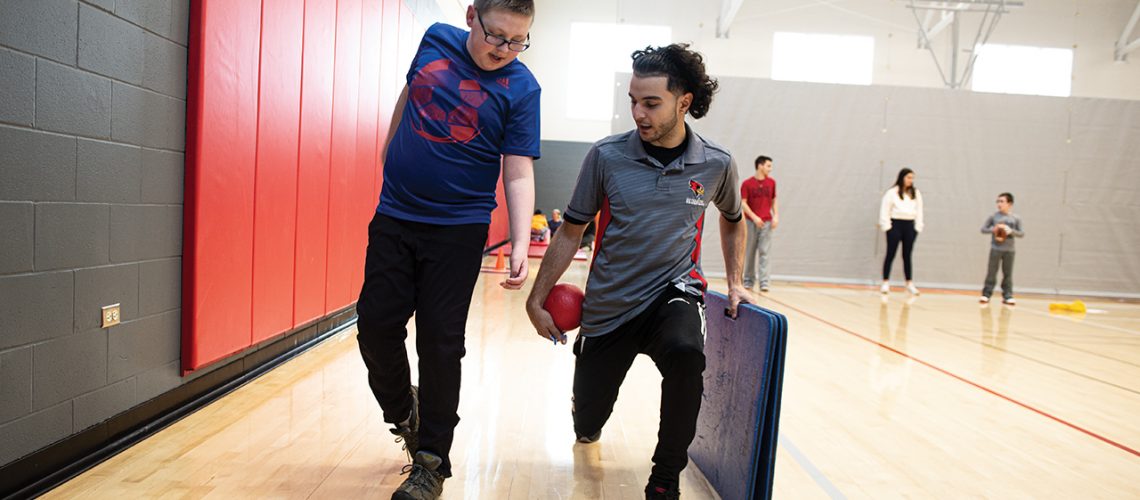Twice exceptional (2e) kids, learners identified as gifted with a learning difference or learning disability are often thought of as kids who can be competitive, who often need to move, are chatty, and like games; so how come so many 2e kids crash and burn in Physical Education (P.E.) class? What can gym teachers do to help 2e kids succeed?
First of all, once you’ve seen one 2e kid you’ve seen one 2e kid – so any attempt at generalizing the 2e population tends to fall on its face. Many 2e kids are introverted or shy, and some are physically challenged. Those might be obvious reasons that P.E. is dreaded by a 2e child. However, plenty of 2e kids love sports, revel in creating games and rules, and appreciate a physical break during the day. So how come so many of my clients report that their child is sent to the hall, to the principal’s office or are given warnings and consequences in PE class?
Why P.E. Class is Hard
Often 2e kids struggle with making successful social connections. Social skills require strong executive functions, and 2e kids often miss the mark at connecting appropriately with peers. Whether they are out of sync with their age peers’ interests, they avoid small talk and social niceties, or impulsivity affects their ability to filter thoughts, 2e kids may suffer in gym class because their friend bench isn’t very deep. They may not get picked for a team, they may misread cues and react to them, and while they are in gym class, their nervous system is often heightened so they react to these feelings.
Speaking of nervous systems, gyms are typically loud and echo-ey. When gym teachers blow a whistle, it’s often jarring, and unexpected. Furthermore, physical proximity in gym class can be an issue. The sensory overload that occurs in P.E. class can empty a 2e kid’s bucket of resilience making them reactive.
On top of it all, the strong sense of justness and fairness 2e kids experience can cause challenges during a gym class game or competition. The 2e child will have a hard time backing down from his argument that they or their teammate, for example, didn’t actually step out of bounds, or double dribble. Perhaps they are frustrated with teammates who don’t appear to try, or take the game as seriously as they do. Black and white thinking, typical of the twice exceptional profile tends to cause this type of learner to become frustrated with fuzzy rules or exceptions.
Ironically, needing to move could be the 2e learner’s downfall in P.E. There’s often a lot of ‘standing on lines’ and waiting for directions during P.E. class. For the learner who needs to move and is looking forward to it, entering the gym and then being asked to ‘sit on the line’ can cause the child to want to do anything but that.
These potential negative experiences during gym class are somehow burned into the 2e child’s memory. Unfortunately, a 2e child’s memory for negative interactions is strong. Just the knowledge that something might go wrong, based on previous experiences, can lead to challenging behavior.
What Teachers Can Do
Just knowing the potential pitfalls described above can help a teacher anticipate challenges in gym class. The following best practices can help the class run more smoothly and increase a 2e student’s emotional and physical safety.
Parents often tell me that their 2e child feels like the gym teacher ‘wasn’t watching.’ It’s hard to watch everything going on in a P.E. class, however, if there is a child who typically missteps in gym class, the teacher should plan on making sure that child is safe. This safety refers to teaching the child skills he is lacking; like group interaction, clearly understanding the nuances of games, and respecting sensory sensitivities. Helping the 2e child navigate complex social, physical, and emotional challenges makes P.E. class a safe and more fun place for all.
- Pick the teams. Don’t leave it up to students to decide who’s on whose team. Count off random teams, or better yet, engineer it so the 2e kid is with other kids who tend to be patient and empathic.
- Give your 2e student a job during ‘standing still’ time. Let him take attendance on a clipboard or run and get the supplies that you need. He’ll learn the rules and directions in a second – so print them off and hand them to him.
- Use humor. Who knew P.E. could be so serious? For a 2e kid that is often the fact. So, insert humor into your class – laughter deflates anger and frustration.
- Check in with kids who seem negatively affected by your whistle. See what would help. What if you can give a warning before you blow the whistle? Maybe clapping is less jarring or perhaps they’ll suggest some other way of getting the kids’ attention. You won’t know until you ask.
- Make sure kids move in the ways that address their bodies needs and abilities. Consider sharing a checklist of choices with students to see what activities they like best and which they really don’t like. Tailor your class using this information.
Physical education, like recess (another place 2e kids often crash and burn), should be a welcome respite for all students. Keeping this awareness in mind and utilizing these strategies can help gym teachers make P.E. an enjoyable experience for everyone.

Author: Julie F. Skolnick M.A., J.D.
Julie Skolnick, M.A., J.D., is the Founder of With Understanding Comes Calm, LLC, through which she passionately guides parents of gifted and distractible children, mentors 2e adults, and collaborates with and advises educators and professionals on bringing out the best and raising self-confidence in their students and clients.


2 Responses
oh my goodness. I have just realised why I faked a stomach ache every PE lesson for a year when I was 8 years old. No one asked me why I didn’t like PE. They just got cross with me. Thank you for this blog post.
Thank YOU for sharing your ‘aha moment.’ So sorry you’ve been carrying that around (consciously or sub-consciously) for so long.